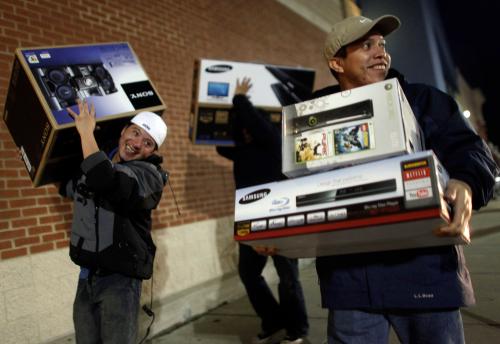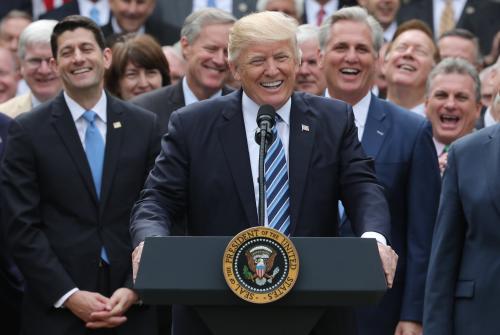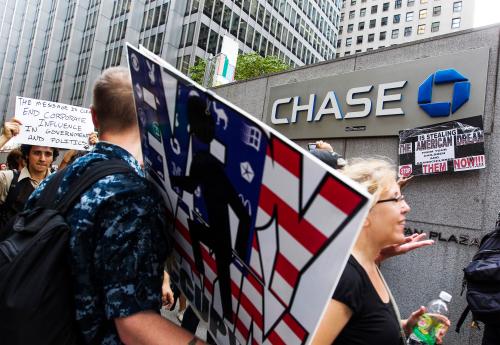This piece was originally posted on Real Clear Markets on December 6, 2016.
Among white voters without a college degree – the so-called white working class – Donald Trump won by 39 percentage points. Since this group of less educated whites represents about one third of the electorate, we need to understand why it went so heavily for Trump. Was it economics or culture?
The economic argument holds that decent paying jobs are disappearing as a result of trade, technology, and de-industrialization. With a scarcity of good jobs, many people – men in particular – have faced high rates of joblessness. Some have chosen not to work at all rather than accept very low paid jobs. Cut loose from the moorings that work and a sense of contributing provides, many of the working class have become discouraged or depressed and have turned to unhealthy behaviors, even suicide; causing a rise in mortality, as documented by Anne Case and Angus Deaton. Their health problems can be linked back to their poor economic prospects and the associated loss of meaning in their lives. Evidence for this story has been found in several economic studies. For example, a recent paper by Justin Pierce and Peter Schott shows that rising imports from China following the liberalization of trade in 2000 has led to both bad employment outcomes and rising suicide rates in the U.S. counties most affected even after carefully controlling for other possible explanations. Under these circumstances, Trump’s promise to reduce competition from trade and immigrants was the right message – or so goes the economic side of the argument.
Trump’s promise to reduce competition from trade and immigrants was the right message – or so goes the economic side of the argument.
The cultural argument is more about identity politics and lack of trust in mainstream institutions. Trump’s bigoted comments, his refusal to be deterred by elite opinion, his success in business, and his outsider status all appealed to small town and rural white Americans of modest means. They were more angry than poor. As Arthur Brooks has put it, they have lost dignity, not just income.
Evidence for the cultural side of the argument is also strong. First, there was Thomas Frank’s What’s the Matter with Kansas?, arguing that the white working class is so concerned with guns, gays, and abortion that they vote Republican despite its very negative implications for their own economic prospects. (Frank has a new book called Listen Liberal arguing strongly that the fault lies with Democrats for not paying enough attention to this group.)
More recently, several new books and articles have elaborated on the theme. The two most important, I think, are Hillbilly Elegy by J.D. Vance and Strangers in Their Own Land by Arlie Hochschild. Both are close-up portraits of two white working class communities, one in Appalachia and one in Louisiana. They portray a group of people in rural or small town America with middling jobs and a host of problems from broken families to drug addiction but also a fierce loyalty to family, community, and church. They resent upwardly mobile minorities, immigrants, and liberal elites. And even the women in these communities believe that women should not compete with men. They hate government in almost all of its manifestations even though they are often dependent on it themselves. They are especially critical of bureaucrats who have “cushy jobs” and of people who rely on “handouts” from the government.
Hochschild’s masterful book makes clear that the conservative politics she finds in Lake Charles, Louisiana have no rational basis. It is delusional and self-defeating. As in Frank’s Kansas, people are clearly voting against their own self interest. The terrible human and natural devastation wrought by toxic chemicals in the area goes hand in hand with hatred of the EPA and a ready acceptance of wrongdoing by corporate polluters (who do at least provide jobs). She calls this “the great paradox.” What she finds is an emotional and irrational attachment to a set of conservative views, driven by Fox news and its equivalents, by resentment of elites, and by the fact that everyone else holds the same anti-government attitudes. These conservative beliefs are a comforting tribal imperative reinforced by friends, family, and neighbors.
Vance, who grew up in Appalachia, also talks about disdain for mainstream institutions and liberal elites. He emphasizes, in addition, the role of “learned helplessness,” a kind of fatalism born of having too little control over one’s life. Then there is the association of doing well in school with femininity and the breakdown of the family. A teacher he interviews says she is expected to shepherd the children in her community but complains that their parents are often wolves.
Trump spoke to these people in the heartland, not just because he was against trade and wanted to make America great again, but because in speech and attitude, he thumbed his nose at the elites. He may have been rich but his rhetoric was not polished and certainly not politically correct. Many who voted for him were clearly racist and misogynist, but perhaps less out of dislike for individual blacks or women, but because these groups and their liberal advocates are seen as asking for special privileges not available to the white working class.
There has been an outpouring of other commentary on these issues. Joan Williams talks about a class cultural gap (professionals especially are resented by the working class) and the loss of “manly dignity” in these communities. Others who have weighed in include Charles Murray, Jonathan Rothwell, Alan Krueger, Nick Eberstadt, Scott Winship, Richard Reeves, Carol Graham, and the Economist magazine. The Economist, for example, finds that markers of an unhealthy life style (obesity, heavy drinking, lack of exercise, diabetes) are a better predictor of Trump’s margin over Romney than any other variable, including lack of education (although this is a close second).
I confess to being unsure about how to interpret all of this. Of course both economics and culture matter. Indeed, they interact. So, it’s complicated. Perhaps Charles Murray is right when he argues in Coming Apart that the breakdown of the family has played a primary role. Perhaps Thomas Frank and E.J. Dionne are right that the Democratic party has fallen down on its historical commitment to the working class and that the solution is more and better jobs. (But whether the promise of better jobs would swing a lot more votes into the Democratic column, as many assume, remains unclear.) Perhaps David Brooks is right that people are lonely and sad. Probably everyone is partly right such that we shouldn’t look for simple explanations, much less simple answers. But the recent election has been a wake-up call to dig a little deeper.






Commentary
Op-edDonald Trump’s election: Was it economics or culture?
December 6, 2016